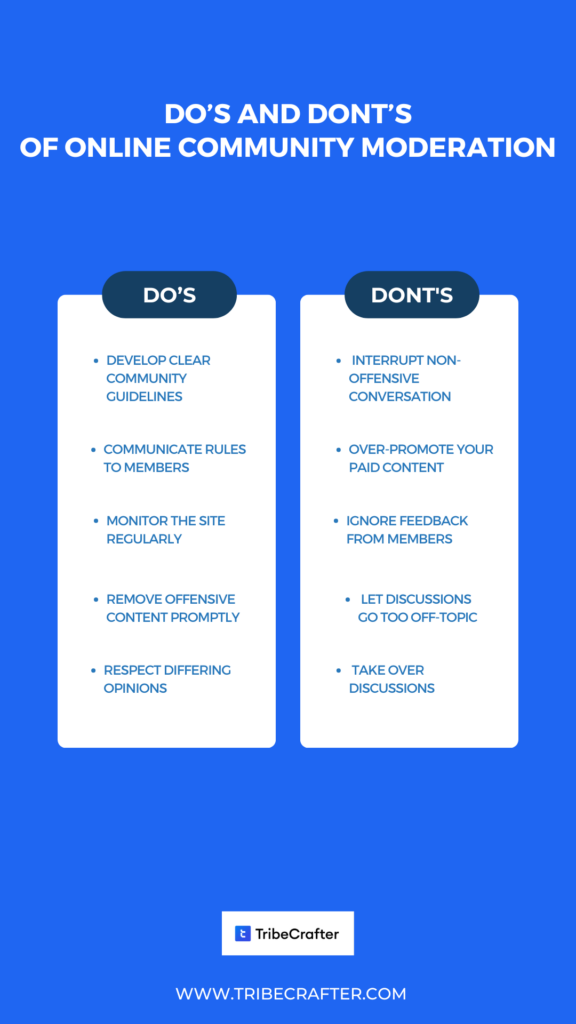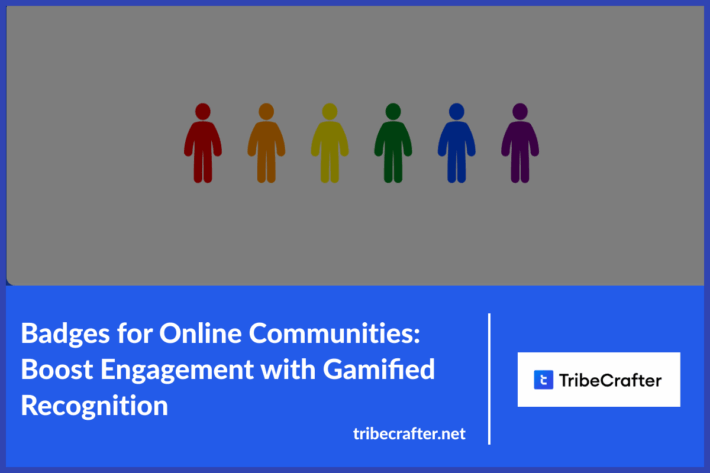Online Community Moderation: 8 Best Practices for Success
Creating online communities is a great way to build and grow your brand. Such platforms help in strengthening your relationship with the customers and aid in improving your brand identity.
A study by CMX Hub revealed that 85% of businesses believe that building a community has improved their customer journey and increased trust.
However, running a virtual community smoothly does not seem easy as it may sound. As a community owner you may experience certain conflicting situations within a community. For instance, a minor disagreement among members can quickly escalate into a heated conflict, disrupting the harmony of the community.
In such scenarios, if you lack effective community moderation strategies, you may end up in a disastrous situation that could result in the loss of valuable customers.
If you are looking for effective online community moderation tips, this guide is for you.
Table of Contents
Role of an online community moderator
The individuals who enforce the community’s rules are known as community moderators. They read topics and threads to make sure they adhere to your community’s standards.
Community moderators are required to intervene when rules are violated. Anything from banning users to removing posts could fall under this category. It is easier to maintain consistency when activities are outlined in moderation standards.
Moderators might additionally have the authority to decide who is allowed to join a community. In this situation, they must review applications in order to determine who is added to the forum.
Online Community Moderation Tips
Moderating an online community effectively is essential for establishing a safe and engaging environment. Here are key strategies to consider:
1. Establish Clear Community Guidelines
Creating a set of clear guidelines is fundamental. These should outline acceptable behavior, the types of content that are prohibited (e.g., violence, harassment), and the consequences for violating these rules. Guidelines should be easily accessible and communicated to all members, ensuring everyone understands the expectations.
Your rules should address respectful communication, a zero-tolerance policy towards spam, and how inappropriate content should be reported.
2. Designate and Train Moderators
Managing an online community is a tough job, especially if you have a large community. Select trusted individuals from your community to act as moderators.
Look at individuals who understand what the community is all about, who use it often and regularly, and who communicate well.
It’s crucial to train them on the community guidelines and how to handle rule violations effectively. Training ensures consistency in moderation and helps maintain the community’s tone.
3. Encourage a Members Involvement in Moderation
Encourage members to participate in moderation by reporting inappropriate content or behavior. Implement a clear reporting process so members know how to act when they see violations. This approach not only alleviates some burden from moderators but also helps build a community that supports itself.
4. Monitor Community Engagement Regularly
Regular monitoring is vital, especially in larger communities. This includes not just looking for offensive content but also being aware of microaggressions or escalating disagreements. Monitoring helps improve community engagement and allows for timely interventions when necessary.
5. Maintain a Low-Key Moderator Presence
While moderators should be active, they should not dominate conversations. Their role is to facilitate discussions rather than control them. Allowing members to express themselves freely helps in creating a more vibrant community atmosphere.
Modern platforms offer tools to make moderation easier, like content filters, automated warnings, and banning tools. TribeCrafter provides advanced moderation features, such as customizable filters and analytics, to help you manage your community effortlessly.
Signup today to know more about TribeCrafter.
6. Respond Promptly to Issues
Timely responses to posts or issues are crucial for maintaining order and trust within the community. Addressing problems quickly demonstrates that moderation is active and that community guidelines are taken seriously.
7. Encourage Quality Contributions
Quality content keeps members engaged. Recognize and reward meaningful posts, highlight valuable contributions, and create themed discussions or challenges to spark creativity.
TribeCrafter allows you to spotlight top contributors, motivating others to share thoughtful posts.
8. Gather Feedback and Improve
Your community’s needs will evolve over time. Regularly ask members for feedback on moderation practices and community culture. Use their suggestions to improve the overall moderation strategies of your community.
Dos and Don’ts of Online Community Moderation

Common Challenges in Community Moderation
Even the best moderators face challenges. Negative behavior, balancing freedom and control, and handling community growth are common issues.
Keeping community members engaged over time is another persistent challenge. As communities grow, maintaining meaningful interactions becomes increasingly difficult.
Enforce rules consistently, allow healthy debates without over-moderation, and add more moderators or advanced tools as your community grows.
Final Thoughts
Moderating an online community requires clear guidelines, consistent effort, and the right tools. The tips discussed in this article will help you create healthy, dynamic, and safe place for your members.
And if you have TribeCrafter, the process of doing this gets trimmed down and it lets you spend more time on building a vibrant and supportive community instead.
Online Community Moderation Tips – FAQs
1. How can I effectively train new moderators?
Develop a comprehensive training program for your new moderators. This program must cover the rules and best practices necessary for effective community moderation.
2. How do I balance being active in the community while moderating?
You can do so by using automated moderation tools, engaging proactively and scheduling your time.
3. How do I encourage members to follow guidelines?
Set clear rules, and reward good behavior with recognition.
4. Can automation replace human moderators?
No, but it can handle repetitive tasks like spam filtering.
5. How do I handle members exhibiting challenging or disruptive behavior?
Give warnings for minor issues and remove repeat offenders.



